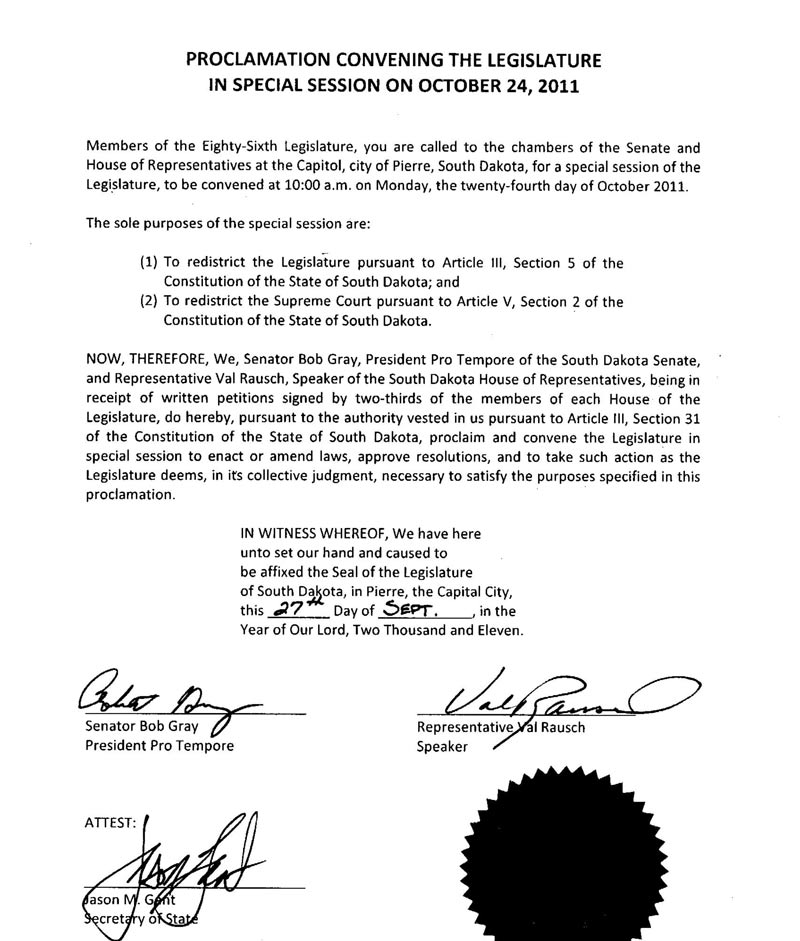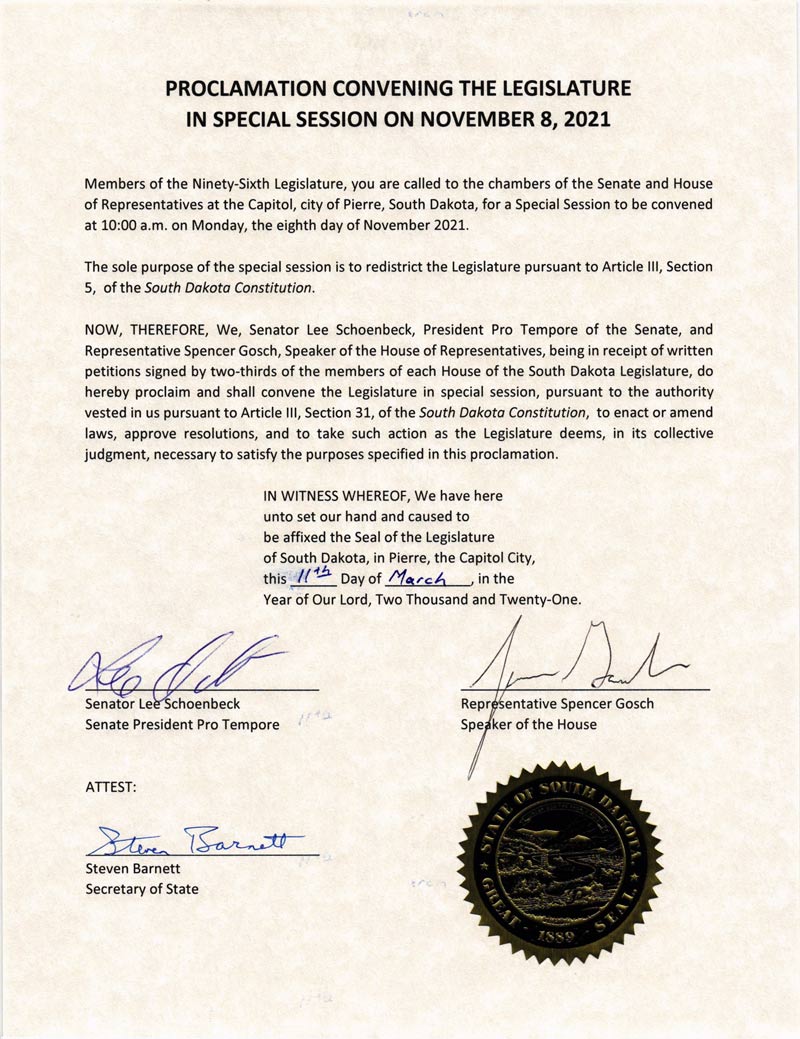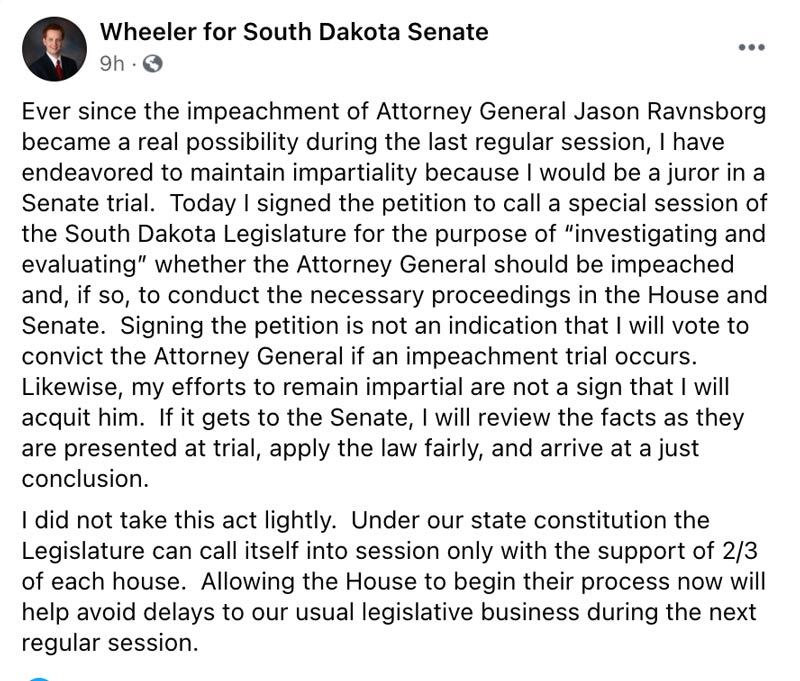Article III § 31. Convening of special sessions upon petition. In addition to the provisions of Article IV, § 3, the Legislature may be convened in special session by the presiding officers of both houses upon the written request of two-thirds of the members of each house. The petition of request shall state the purposes of the session, and only business encompassed by those purposes may be transacted.
– Amendment proposed by SL 1990, ch 2, approved November 6, 1990.
In 1990, a constitutional amendment was passed to grant the South Dakota Legislature additional authority to call itself back for a special session when two-thirds of the members of each house petition for a special session for a specific purpose. That authority has only been utilized by the South Dakota Legislature on a very limited basis since that time, and up until now, only for redistricting.
According to a 2021 draft memorandum on the topic from the Legislative Research Council:
The Legislature’s ability to call a special session was approved by the voters in 1990. As a result, Article III, § 31 provides, “In addition to the provisions of Article IV, § 3, the Legislature may be convened in special session by the presiding officers of both houses upon the written request of two-thirds of the members of each house. The petition of request shall state the purposes of the session, and only business encompassed by those purposes may be transacted.” Since 1990, the Legislature has called special sessions in 2001 and 2011. Both sessions were called for the purpose of redistricting. The Legislature has also called for a redistricting special session to be convened on November 8, 2021.
As noted, the “Special Session by Legislature” has previously been exercised three times, and you can find a couple of them on-line if you look hard enough:


Redistricting is a fairly ministerial task, so while people are going to quibble about where the lines are drawn, people agreeing to hold a session for that purpose is fairly non-controversial.
But now we’re faced with a call for a special session for a more controversial purpose, for the impeachment of a state official. In connection with the call for the convening of the legislature, the Speaker of the House is setting forth that the vote on whether or not to come into session will be held as secret from the citizens of South Dakota:
..South Dakota’s House Speaker Spencer Gosch, R-Glenham, told the Argus Leader this week the names of lawmakers who sign the petition for a “Special Legislative Session on Impeachment” will not be released to the public.
“We’re just voting for a meeting. That’s all we’re voting for,” he said. “So ultimately, who voted on whether or not we should get together is not relevant.”
and..
And though he intends to make resolutions, testimony and committee meetings regarding impeachment open, he cites a provision in South Dakota’s open records laws allowing correspondence among public officials for keeping petition signatures secret.
and..
In the Senate, two-thirds of members are also required to sign on to the House leaders’ petition and those names won’t be public either. That’s because Senate President Pro Tempore Lee Schoenbeck, the Watertown Republican who presides over that chamber, said he’s following the House’s lead.
As you can read in the article, open government advocates disagree with the decision. The law for “correspondence among public officials” is the one being cited to give the legislature an out for releasing the vote on the petition. But what does that law actually say?
1-27-1.5. Certain records not open to inspection and copying.
The following records are not subject to §§ 1-27-1, 1-27-1.1, 1-27-1.3, and § 1-27-1.23:
(19) Personal correspondence, memoranda, notes, calendars or appointment logs, or other personal records or documents of any public official or employee;
But that’s personal correspondence. Under this law, I’m not sure how one considers the actual written petition to impeach as personal correspondence.
While it’s noted that legislators are “just voting for a meeting,” the State Constitution is pretty clear that the special session demands that it can only be held “upon the written request of two-thirds of the members of each house.” Written is definitely stated. So, these written documents should be filed somewhere.
The bigger question is whether they will ever see the light of day. Because the State Constitution does provide the legislature a more clear-cut out, but it’s not going to play as well when it’s invoked:
Article III § 15. Open legislative sessions–Exception. The sessions of each house and of the committee of the whole shall be open, unless when the business is such as ought to be kept secret.
That’s the portion of the State Constitution that allows the South Dakota State Legislature to invoke “we’ll do what we want,” and decide for themselves what they want to keep from the voters of the state. I’m not sure any court has tested the “ought to be kept secret” portion of the constitution, but it would make an interesting debate as to what scenarios the courts believe that would entail.
Now, not all legislators are so concerned with keeping where they stand on a special session hidden from the public. In fact, some are more open about it, such as State Senator Dave Wheeler:

His position is certainly not enviable, but legislators were elected to make decisions on behalf of all their constituents. And there is a general expectation from the people of South Dakota is that they will do so in the light of day.
The past session, there were a number of legislators who stood up and were eager to be on the record, so much so that members of House leadership held a press conference. Which makes the more recent reluctance to be on the record a bit confusing.
I’m sure we’ll see this play out more in the days to come while we wait to see what the legislature decides to do.
Stay tuned.

Keeping it secret is inexcusable, and to rely on the correspondence section of the law is crazy. I certainly hope the Argus Leader or someone files an open records request and fights this one out.
I appreciate David Wheeler announcing and explaining his vote. Good public servant.
Exactly. They should all do that. If you are afraid to have your decision on this be public, perhaps the legislature isn’t for you.
David is always top drawer. Glad he’s my senator.
I whole heartedly agree with the above comments. As an elected official, your decisions/votes should always be public knowledge and scrutinized accordingly. If this is a problem, then that elected official should resign immediately.
I hope that there will be severe repercussions come November 2022 for all of the SD Legislators involved in this fiasco.
What a shame.
So they don’t release the names in the past but now they should…..huh…..
I’m sure they were available if someone asked, but as noted, redistricting is a pretty ministerial act, as well as being required in the Constitution.
Lets release the videos , lets release bodycams…now lets change how we call for special session…as long as we are motivated by our hate of Ravnsborg, civil rights don’t matter right?
If they can do it to the AG they can do it to you.
I don’t believe anybody is calling for that, but votes taken by legislators, as well as most official documents are considered public information.
Soooo . . . Court decides a year from now that the Legislature cannot vote in secret, so as a result the special session is declared invalid. Assuming the session results in the impeachment of the AG, the impeachment is also declared invalid.
Way to think this through, Mr. Speaker.
Are we going to criticize each and every decision in this matter….if Noem doesn’t get her way she whines…it is getting old fast
For the life of me, I can not understand why people who think two minor traffic misdemeanors are impeachable offenses would be unwilling to go on the record.
Would not be willing
How about behavior unbecoming of an elected position? Is that reason for being impeached? Drunk on the job? Fraternizing with interns? At what point does something reach that level? Are we only supposed to look at the actual criminality of the issue, or can we look at the ethical and moral questions? I would say that if a large amount of our citizens recognize someone needing to resign for their actions, criminal or not, then at the very least it is up to our elected officials to explore and investigate if that is a necessary action. What we do know is that his behavior didn’t rise to the level of negligence or recklessness to warrant a larger criminal punishment, but if he were in many other states, including everyone of our neighbors, he would have found himself on the wrong end of a care required to operate a motor vehicle law which would have covered negligence to the extent that he was not operating his vehicle in a safe manner that resulted in a death.
I agree with Troy. These are not impeachable offenses. I have looked and cannot find ANYTHING close to this as an impeachable offense anywhere in the country.
The prosecutors looked at all the evidence and came up with a few minor traffic offenses. So what do mostly non-lawyers, let alone non-prosecutors and non-criminal defense lawyers hope to gain by looking at the what has already been looked at in depth.
So why vote for a special session? No reason for it as there are no impeachable offenses in the end anyway.
it is customary for public boards (city councils, county commissions and school boards) to have closed meetings to discuss personnel issues, y’know
That’s right. However, they cannot vote on anything during that executive session. They must vote in open session. That’s the law.